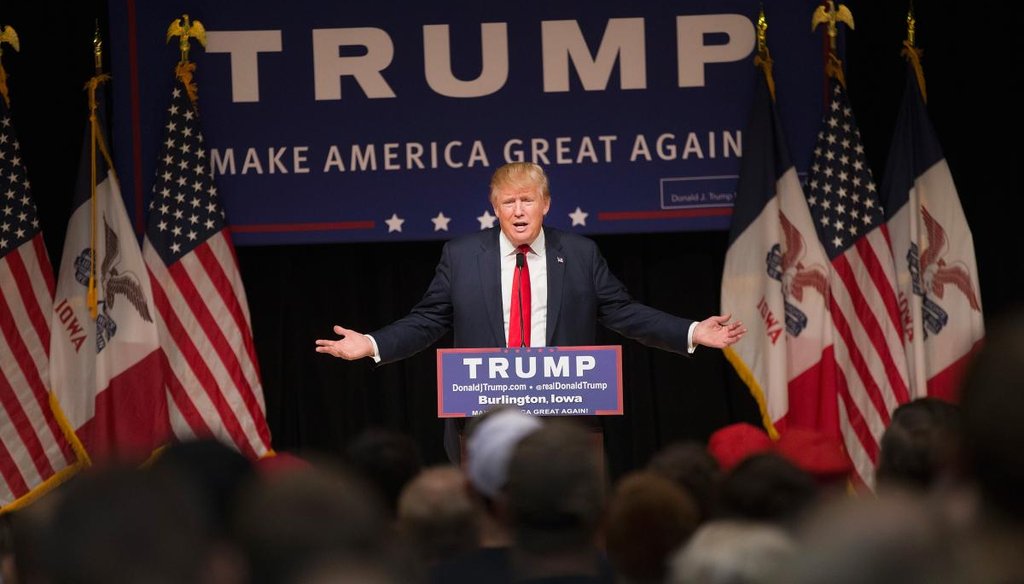Stand up for the facts!
Our only agenda is to publish the truth so you can be an informed participant in democracy.
We need your help.
I would like to contribute

GOP presidential candidate Donald Trump rallies guests at Burlington Memorial Auditorium on Oct. 21, 2015, in Burlington, Iowa, during a campaign stop. (Getty)
New polls that show Ben Carson leading Donald Trump in Iowa have put Trump on the defensive in recent days, subtly questioning Carson’s Seventh-day Adventist religion and Carson’s energy to lead the country.
On ABC This Week Sunday, Trump described comments over the weekend that he doesn’t "know about" Seventh-day Adventists as a statement of unfamiliarity and not criticism.
"I know nothing about it really. I’m a Presbyterian and I had mentioned that, and I did say I don’t know about it. And in fact those are my exact words," Trump said. "So I just really don't know about the Seventh-day Adventists."
Something Trump did know about Sunday was Obamacare, which he called a disaster of a law that needs to be repealed.
"The one thing we have to do is repeal and replace Obamacare," Trump told ABC’s George Stephanopoulos. "It is a disaster. People’s -- I don’t know if you have been watching lately over the last couple of weeks -- people’s premiums, George, are going up 35, 45, 55 percent. Their deductibles are so high nobody’s ever going to get to use it. So ... Obamacare is turning out to be a bigger disaster than anybody thought."
Sign up for PolitiFact texts
Trump’s claim that premiums "are going up 35, 45, 55 percent" rates Half True.
Let’s begin with a brief primer on premium hikes. Under the Affordable Care Act, insurers planning to increase their rates by more than 10 percent have to submit proposals for federal review. In many states, the companies also have to negotiate their prices with a state insurance commissioner.
Generally, the finalized premiums will be equal to or lower than the proposed rates, according to Larry Levitt of the Kaiser Family Foundation, a leading nonpartisan health policy research center. With five days left before open enrollment begins on Nov. 1, rates are likely already approved or amended, but not all them have been publicized.
Trump has a point that some insurers have requested increases that hit high double digits.
"Yes, some people in some plans through some carriers in some states are, indeed, looking at rate hikes of ‘35 to 50 percent’ if they stick with those plans in 2016," said Charles Gaba, who runs the popular blog ACAsignups.net, which tracks Obamacare enrollment.
"This is not completely off the wall. Many of the popular plans requested high increases," said Gail Wilensky, a health economist and the head of Medicare and Medicaid under George H.W. Bush. "Those hikes will affect more people than some may think."
She pointed out that Blue Cross Blue Shield, a prominent insurer with a significant amount of enrollees, proposed rate hikes of 14 to 38 percent in Illinois and 50 to 65 percent in New Mexico.
But that’s not telling the entire story either, according to the data.
Looking at finalized rates for the lowest and second-lowest cost marketplace plans in the silver category — which are the basis for federal premium subsidies and chosen by 68 percent of enrollees — the average increase is nowhere near 35 to 55 percent.
The Kaiser Family Foundation found that the cost of a benchmark silver plan will be 4.4 percent more expensive on average across major cities in 13 states and Washington, D.C. (That is a smaller annual increase than what had been occurring before Obamacare became law.)
According to Kaiser, enrollees in Minneapolis will see the biggest premium increase at 28.7 percent. On the other end of the spectrum, plans will actually decrease by 10.4 percent in Seattle.
All the experts we spoke to warned us that there’s significant variation from plan to plan, from region to region, and from insuree to insuree. That’s why neither Trump’s claim nor averages tell the whole story.
The disparity in rate increases are more likely adjustments insurers are making, rather than evidence that Obamacare is a "disaster," as Trump says.
After all, 2016 is the first year that insurers are looking at actual claims data instead of "essentially guessing at what their costs were," Levitt said. "Some insurers guessed better than others, which leads to variations in premium changes."
Enrollment figures are different from state to state, which affects the risk pool and the premium changes. Premium rate increases can also be unique to an individual’s circumstances, not necessarily reflective of a national average.
Rubio on abortion
Also on ABC’s This Week, liberal pundit and former Michigan Gov. Jennifer Granholm was asked if Democrats fear that Florida Sen. Marco Rubio becomes the establishment alternative to Carson and Trump.
Not really, Granholm said. "He’s one of the most extreme," she said. "For example, he doesn’t agree with a woman’s right to choose even in the case of rape or incest."
That claim rates Mostly True.
Rubio says he will support anti-abortion legislation that includes an exception for rape and incest, but he prefers that the procedure be illegal even in cases of rape and incest.
Rubio recently discussed his position on abortion during the first Republican presidential debate, Aug. 6, 2015, in Cleveland. Fox News moderator Megyn Kelly set up a question by saying Rubio favored a "rape and incest exception to abortion bans."
"Well, Megyn, first of all, I'm not sure that that's a correct assessment of my record. I would go on to add that I believe all … " Rubio started before being cut off.
"You don't favor a rape and incest exception?" Kelly asked.
"I have never said that," Rubio responded. "And I have never advocated that. What I have advocated is that we pass a law in this country that says all human life at every stage of its development is worthy of protection. In fact, I think that law already exists. It is called the Constitution of the United States."
Rubio never definitively answered Kelly’s question about whether he favors such an exception. But he clearly bristled at the suggestion that he favors an abortion exception for rape and incest.
He tried to explain himself a few days later on NBC’s Meet the Press.
"I'll support any legislation that reduces the number of abortions, so that means a 20-week abortion ban. At five months, a child -- you'll recognize it as a human being in an ultrasound image. And I'll support that. That doesn't obviously cover the whole gamut, but it reduces the number of abortions," Rubio said.
"I'll support any legislation that reduces the number of abortions and there are those that have that exception in it. What I've never done is said I require that it must have or not have exceptions."
In November 2013, Rubio was one of 40 co-sponsors of a Senate bill entitled "Pain-capable unborn child protection act." Several GOP presidential candidates backed the bill, including main sponsor Lindsey Graham of South Carolina and co-sponsors Ted Cruz of Texas and Rand Paul of Kentucky. The bill bans abortions at 20 weeks or greater but includes exceptions, including rape and incest.
"I personally and deeply believe that all human life is worthy of the protection of our laws, I do," Rubio said in his Meet the Press interview. "And I believe that irrespective of the conditions by which that life was conceived or anything else, and for me to be consistent on that belief, that's why I feel so strongly about it.
"That being said, I recognize that in order to have a consensus on laws that limit the number of abortions, a lot of people want to see those exceptions and that's why I've supported those laws in the past, as has every pro-life group in America."
Our Sources
See individual fact-checks.







































